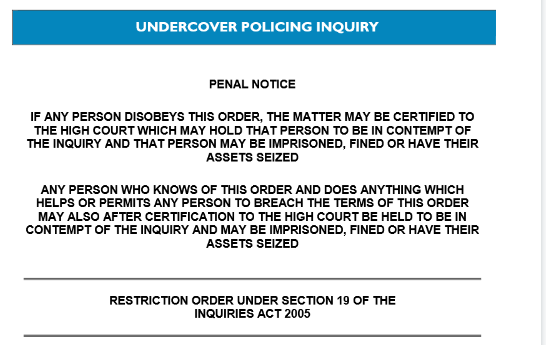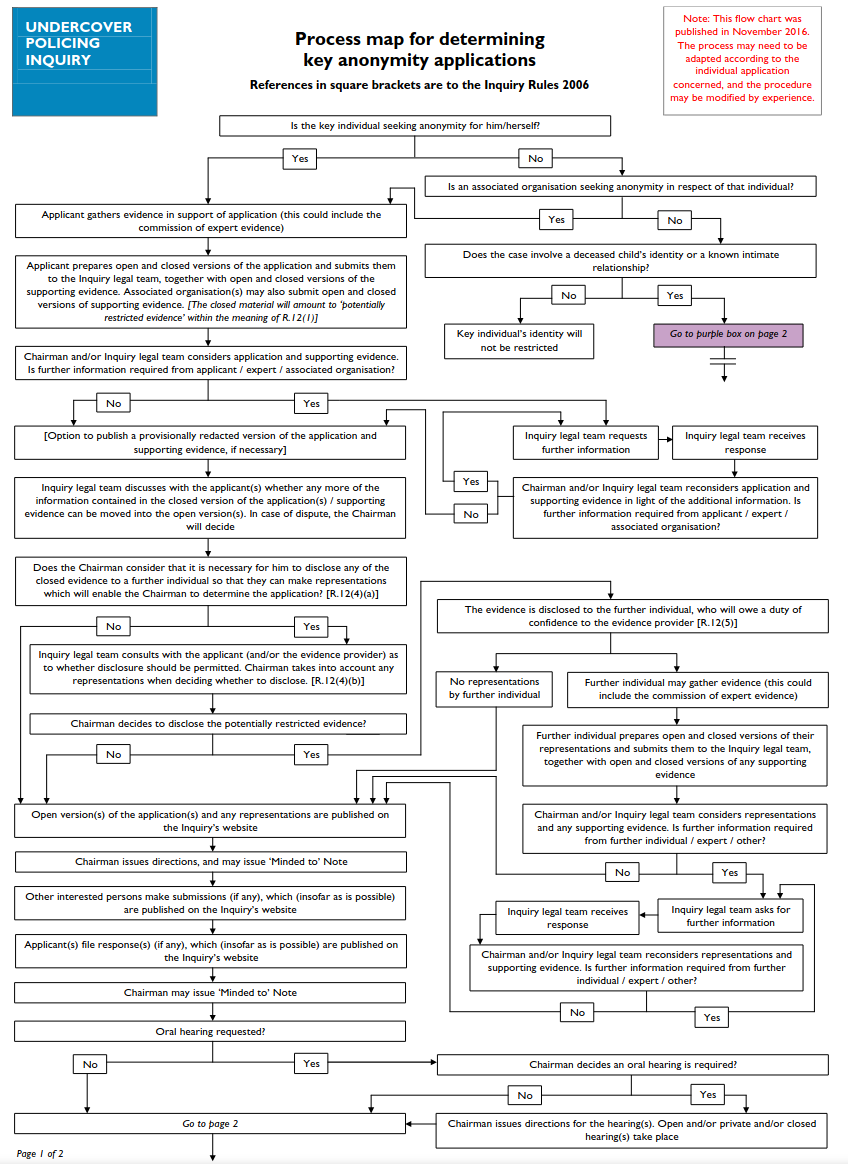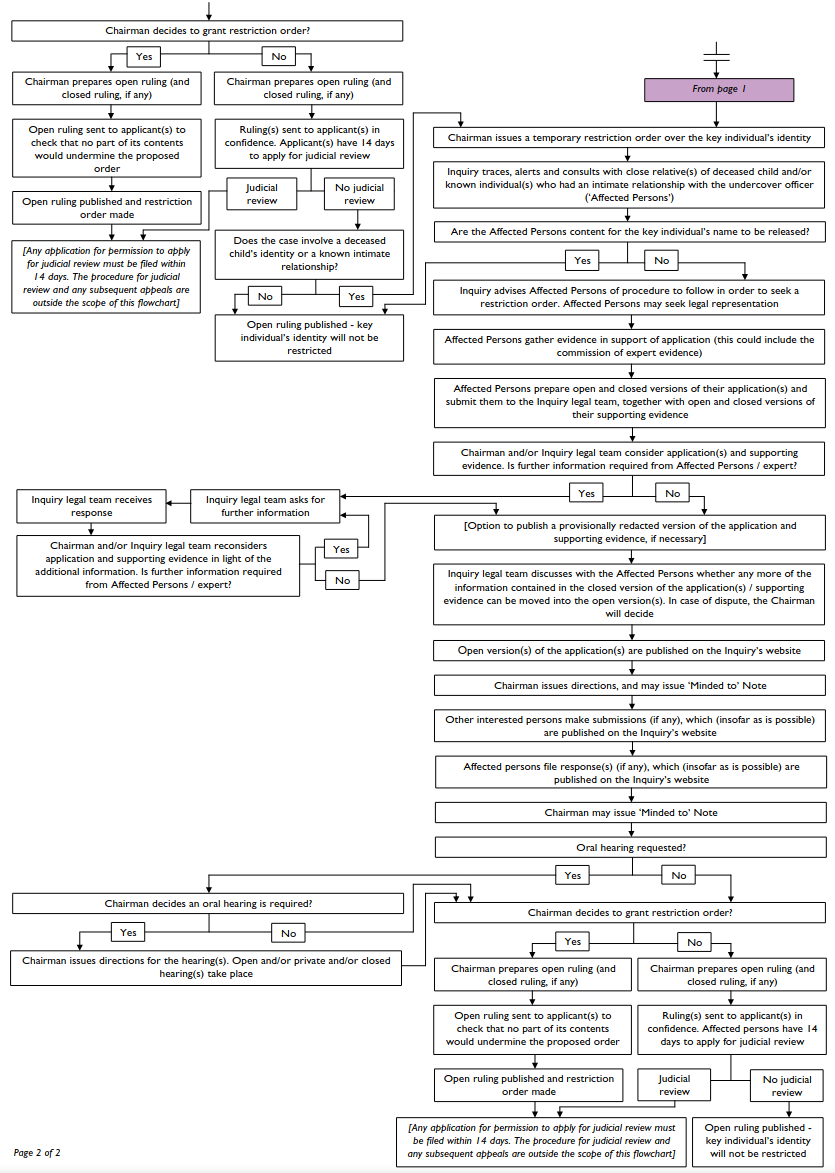Any core participant in the Undercover Policing Inquiry (UCPI) can request a restriction order to prevent their name and other identifying material being disclosed to the public or other core participants.
These are generally referred to as Anonymity Orders, or sometimes as Section 19 Requests (after the relevant part of the Inquiries Act 2005 which sets out the legal framework for inquiries to grant such orders).

Special Demonstration Squad (SDS)
Cover names: 117 undercover officers (UCOs) in total, of which 70 cover names were published. 55 applications made for anonymity of which 38 were granted and 17 refused. 9 cover names were not known, and 53 made no application or withdrew them.
Real names: 170 UCOs, back office and managers (117 SDS undercovers; 53 SDS managers/back office). 109 applications were made and 61 with none made or withdrawn. 99 real names restricted. 9 applications were refused. One application still to be determined. Hence, of all SDS officers, 70 names were not restricted with 99 having real name restricted.
Overall 165 SDS officers were involved in the anonymity process, with a further five having their real and/or cover names published without being included in the process.
National Public Order Intelligence Unit (NPOIU)
Cover names: 22 UCOs: 18 applications made, and 4 not made/ withdrawn. 13 cover names restricted, 8 not restricted and one still to be determined.
Real names: 67 UCOs, back office and managers in the anonymity process (22 undercovers, 45 managers or staff): 50 applications were made, with 17 not made or being withdrawn. 29 real names restricted, 24 not restricted, 14 still to be determined.
Non-state core participants
Of the non-state core participants there are currently 29 individuals and one family who have been granted anonymity. Two people have revoked their anonymity voluntarily.
The Inquiry does not always publish names once a ruling against anonymity has been made. Rather it waits until the name comes up in some form of evidence to release it.
The issue of such restriction orders for the former undercovers and their managers has consumed a considerable amount of the UCPI’s time and resources, particularly prior to the evidential hearings. The process that has developed is complex and in November 2016 the Inquiry provided a large flow chart to demonstrate it.
The Inquiry has granted anonymity to any non-state core participant who has requested it. Most use a single-name pseudonym, though some are referred to by one or three letters.
The reasons for requesting anonymity vary, but often focus on preventing damage to reputation given their current life situation, or, as for the majority, further intrusion which would impact on personal or family life which would exacerbate the damage already done by the undercovers.
The situation has been far more complex for former undercovers and their managers. Their situation in the Inquiry is considered to be different as they are the subject of the Inquiry’s investigations. In order for the Inquiry to meet its Terms of Reference, the public needs to know who the undercovers were so they can come forward with evidence.
This picture is further complicated by the fact that a number of the officers went on to serve in other sensitive positions which they argue pose a risk to their safety as well if they were to be identified. A significant question the Inquiry was required to assess was the difference in risk between cover name and real names. Cover names might provide an opportunity for real names to become known if, for example, photographs were published and the person was identified.
A complex process was adopted which involved hiring independent risk assessors to interview the former officers and do other checks. These assessors then made recommendations to the Inquiry as to the level of risk faced by the undercover or of any special circumstances that should be noted.
A further complication was that there were several parties making the applications for anonymity: the recognised legal representatives of the officers (Slater & Gordon, Designated Lawyers) and also the representative police forces, which was in the main the Metropolitan Police.
The reasons given for the need of former officers to have anonymity focused around reputational damage, interference with the right to privacy and family life (the ‘Article 8’ point ) and health issues. A number feared retaliation from the groups they had targeted and/or press interest.
As part of their applications, the undercovers provided ‘Impact Statements’ on how they feared having their real or cover name entering the public domain would affect them. A good number also provided medical assessments setting out the physical and often mental health issues they were experiencing and how the existence of the Inquiry was impacting on that.
These documents were often heavily redacted or simply provided in gist to the non-state core participants and the public.
In general, the Inquiry Chair, Sir John Mitting, tended to grant anonymity orders restricting publishing the real name of the undercovers. In 30% of undercovers where applications have been made and determined , he refused orders over the cover name, so they could be published to enable the public to come forward. In total, 78 cover names have been published, though.
For the rest, he deemed the risk to the undercovers as too great so restricted the cover name as well. The reasoning given was that it was generally not necessary to the work of the Inquiry for the public to know the real names, and the impact on their Article 8 rights. Some anonymity orders over real and cover names have been granted where the officer is deceased in order to respect the rights of their family.
Anonymity was given to some of the real names of the SDS managers, but for the most part these names have been disclosed.
Mitting also undertook to honour Sir Christopher Pitchford’s assurance that women deceived into relationships would be given the real name of the officer and the fullest proper account. He stated:
Where a claim of an intimate relationship with an undercover officer is admitted or found by me to be true, they have a compelling moral claim to know the true identity of the man with whom they had that relationship. When there is material which gives rise to a suspicion that such an intimate relationship may have been formed by an undercover officer in a cover name, there is a compelling practical reason to require the cover name to be published: to reveal to the woman or women concerned that they may have had an intimate relationship with a man in an identity not his own.
Though this has generally happened and restriction orders over real names have been rescinded (or just not granted), it is a qualified right and the Inquiry has not always honoured this, as happened in the case of HN102.
Similarly, in the case of HN1 ‘Matt Rayner’ and HN519/EN1 ‘Marco Jacobs’, those who were deceived into relationships have not been provided his real name.
Other cases have had added complexity: ‘Madeleine’ was not given the real name of HN354 ‘Vince Miller’, i.e. Vincent Harvey, until after she had testified. While for HN104 Carlo Soracchi ‘Carlo Neri’, his ex-wife and family wished to keep the restriction order over his real name despite it being known to non-police parties and it being in the public domain.
The various police forces also strongly argued in favour of principles they wanted to protect, such as ‘Neither Confirm Nor Deny’ (NCND), and the general regime of secrecy when it came to undercover policing generally.
Their position was that secrecy should be maintained as much as possible as otherwise it damaged the effectiveness of the undercover tactic. As a result the first few hearings on the issue focused on the legal regime and principles on which the Inquiry Chair should make his decisions. The police argued strongly that undercovers should be able to rely on the NCND principle and supposed promises made to undercovers that their work would never be revealed.
The then Inquiry Chair, Sir Christopher Pitchford, eventually found against the police on these points on the grounds that they were unrealistic for the police to rely on, not particularly founded in law, and ultimately that the effect of adhering to them would amount to an inquiry which would exclude the public and non-state core participants.
His position, as set out in a UCPI press release on the matter, was:
The Ruling states that there will be no blanket solution in respect of restriction orders and that that the practice of ‘neither confirm nor deny’ will not, by itself, be a reason to make a restriction order, although it may be a consideration as part of the balancing act the Chairman will undertake when applying the legal principles and in weighing up competing public interests.
Nevertheless, the Inquiry Chairs have made many rulings protecting police identities, both real and cover, on grounds as weak as a risk of media intrusion.
There were also issues with the processes by which the applications were being made and the considerable delays being caused. In late 2016, the regime the Metropolitan Police had in place had to be abandoned as their point of contact with the undercovers was also responsible for the risk assessments of the same officers. The process was considered biased (see the Cairo-Jaipur-Karachi issue ) and new independent risk assessors had to be hired. The process was also reviewed in 2017 by the then new Chair, Sir John Mitting, given the ongoing issues.
Consultation on publication of documents relating to anonymity.
The issue of anonymity for the former undercovers was a point of heavy contention for the non-state core participants and was the subject of five procedural hearings. These were eventually abandoned when the non-state core participants conducted a public walk-out as they felt they were being denied any real participation in the process due to the heavy redactions.
A protocol was eventually drawn up on how the process of anonymity applications should work. The Inquiry also semi-regularly published both Explanatory Notes which gave an overview of the status of decisions on each officer, and Updates which provided an overview of the process and statistics on how things were proceeding.
- For details on the legal arguments around the approach to anonymity see under Restriction Order Approach.
Procedural hearing 3: Restriction Order Approach, 22-23 March 2016
Legal principles applying to Section 19 restriction orders and thus in turn applicable to anonymity applications.
Procedural hearing 6: Anonymity (MPS Applications I), Restriction Order Approach, 5-6 May 2016
Anonymity applications and a request from the Metropolitan Police Service (MPS) for the Undercover Policing Inquiry (UCPI) to change its approach.
With the main legal principles having been set out in rulings following previous hearings, this hearing how they applied to Special Demonstration Squad anonymity applications.
Procedural hearing 9: Anonymity (MPS Applications III), Restriction Order Approach, 5 February 2018
Though focusing on anonymity applications, the non-state core participants raised challenges to the approach taken by the UCPI and the Metropolitan police, particularly over risk assessments.
Procedural hearing 10: Anonymity (MPS Applications IV), Lambert Report, 21 March 2018
Addressed the anonymity applications of HN17, HN41, HN64, HN71, HN109, HN125, HN337, HN341 ; hearing marked by walkout of the non-state core participants.
Procedural hearing 11: Anonymity (MPS Applications V), 9 May 2018
With the boycott by the non-state core participants, this short hearing was the last one held in open.
The following non-state individuals have been granted anonymity in the Inquiry. Many are those who had relationships with undercover officers, but others are anonymous because their current life situation would be impacted by being named in the Inquiry. Several are family members of undercovers or former wives. Some are relatives of deceased children whose identities were stolen by undercovers.
| MCD | NRO | VSP |
| MSS | MWS | GRD |
| AN | FCA | RTD |
| AJA | ARB | Alison (RAB) |
| Bea | C | Ellie |
| Jacqui | Jenny | Jessica |
| Lindsey | Lisa (AKJ) | Madeleine |
| Mary | Maya | Monica |
| Naomi (SUR) | Rosa (DIL) | Ruth (TEB) |
| Sara | TBS | S |
| Restricted Family | KTC | Wendy |
| Walter | RDCA (not a CP) | |
| Lizzie (withdrawn as CP) | ||
Several have given up anonymity: 'Andrea' / Donna McClean and 'Jane' / Eleanor Fairbraida.


